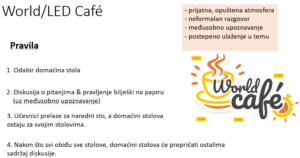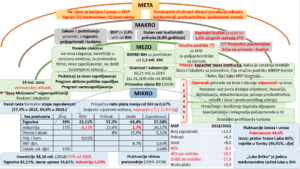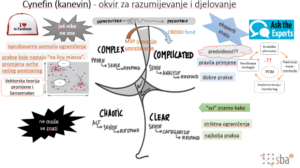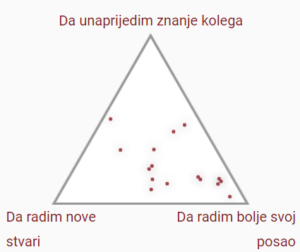We have organized a workshop on the possibilities of applying new conceptual frameworks and tools for planning support for the sustainable development of SMEs in Bosnia and Herzegovina (BiH). The recommendation for selecting frameworks and tools was provided by participants of the Summer Academy held in early July this year in Berlin (more information about it is available here), organized by Mesopartner, with whom we have been collaborating very successfully for over ten years.
Although we did preparation for the workshop carefully and thoroughly, we were not certain about the reaction from the participants, as it involves frameworks and tools that significantly change the currently dominant approach and practices, not only locally but globally. Therefore, we decided on a gradual approach: on the first day in the afternoon, we started with a World/LED café, where participants, in a relaxed atmosphere and informal conversation at the tables, with coffee, first share their experiences in supporting the development of SMEs, then move to other tables and exchange views on new challenges facing SMEs, and in the last round, give each other recommendations on new models, methods, tools, and practices to support the sustainable development of SMEs. In this way, about thirty participants from various organizations (ministries at the level of BiH and entities, institutes for development programming, and faculties, regional and local development agencies, departments for economic development, international projects, and donor organizations) got to know each other better and mentally prepared for bigger challenges that we prepared for the following day.
The next day we started with a conceptual framework that is closer to the understanding and current practice of the participants: the Systemic Competitiveness Framework, already partially tested in our practice. This framework allows an assessment of the current state of SME development and corresponding support in a particular territory, considering four different but interconnected levels: micro (market actions of companies and their networks, recognizing market failures), meso (the space of targeted policies and support instruments for SMEs and organizations providing this support), macro (overview of generic policies and instruments, such as budgetary and tax policy), and meta-level, where numerous influential socio-cultural factors and mental models operate “behind the scenes.” Using one of several domestic examples processed so far, we gradually revealed with participants why in an location that probably provides the richest support for SMEs in BiH, systemic change is not happening, and then collectively came to clear and feasible recommendations on how available policies and support instruments can be repurposed to support smart and inclusive growth (innovation, digitalization, decarbonization; strengthening entrepreneurship among youth and women and entrepreneurial learning) and thus lead to significantly greater added value and better structure of the local economy. The first “test” went well: the relatively new framework was excellently accepted, and participants attentively and understandingly noticed its advantages and possibilities of application in their practice.
A kind of reward to them and us was the brief and effective presentation of the support program of the Swiss Organization for Development and Cooperation, which is provided in the field of economic development in BiH and the Western Balkans region, in the form of a series of projects and support instruments.
We knew that the real challenge was yet to come: how participants would accept another new framework, which fundamentally changes the approach that is becoming dominant in domestic practice. It is about the Cynefin framework, which allows a new understanding of the situations we face and acting in accordance with the nature of these situations. We have been trying to master the application of this framework and new tools it brings since 2015, and our team had a rare opportunity to discuss it directly with its creator, Prof. Dave Snowden. Therefore, we were able to use our own experiences and domestic examples here, helping participants to more easily notice and “bear” the knowledge that most of our current actions do not correspond to the nature of the situations we are in. In planning and providing support for the sustainable development of SMEs, we most often find ourselves in complex situations, characterized by unpredictability and the impossibility of noticing cause-and-effect relationships in advance, before acting, and almost always act with the (wrong) assumption that we know in advance what will lead to what (which activities to which outputs and outcomes), using a logical framework and planning tools based on it, as if we are in predictable situations in which previous analysis and expert knowledge help.
With participants, we shared our knowledge about a new approach to planning and implementing changes, based on vector change theory (this theory is still in development), orientation towards the first next right thing (adjacent possible) instead of towards an idealistic goal set in the future, and a tool that provides deep insights into the potential for change in the current reality (disposition of the things and what changes main actors are prone to, where movement towards the desired change can already be noticed). This is about the SenseMaker tool, which is used for qualitative research and is based on real narratives (stories) that we collect in response to the initial question we want to investigate. The respondents themselves interpret their story, based on previously carefully created triads and dyads. A visual overview of the multiple layouts of these stories enables clear noticing of dominant patterns in the present, but also the first next right things that can be done in the direction of the desired change with less energy and time expenditure. In-depth insights into what and how things can be done to do the right things are realized by opening and analyzing the stories of those who have already made such a shift. Along with an example of a complex situation and a problem we’ve been dealing with for some time (how to support innovations and networking of SMEs, here and now), we also presented part of the results of one of our previous SenseMaker surveys, which showed how little support institutions affect the creation of cooperation patterns among SMEs, as well as examples of when this happened, all from the perspective of the companies themselves as respondents.
Finally, participants had the opportunity to try out how SenseMaker works, by briefly describing some of their insights gained during the workshop and then placing them in the appropriate place within the triangle which explores the possibilities of using those insights after the workshop.
Although we were able to follow a high level of interest and attention from all participants throughout the entire workshop, unusual for such new things that change perspective, we were sincerely surprised and delighted by the applause with which they spontaneously rewarded our effort after the sentence that marked the end of the joint work. The applause, interest, and reactions of the participants testify that this is not the end, but the beginning of joint, creative creation of responses to the challenges faced by SMEs and support institutions, here and now.
The workshop was organized as part of the activities of the project “Advanced implementation of the Small Business Act BiH2EU – SBA in BiH2EU” which is implemented by Eda in cooperation with the Sarajevo Economic Region Development Agency SERDA and funded by Sweden.












